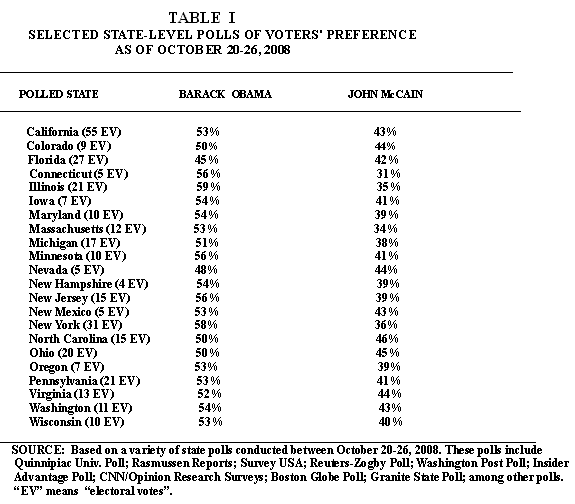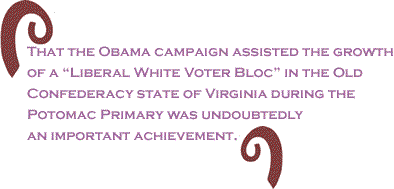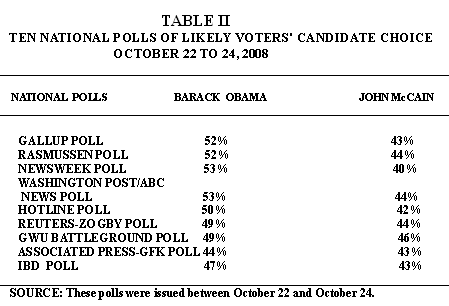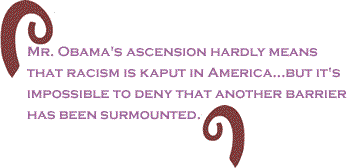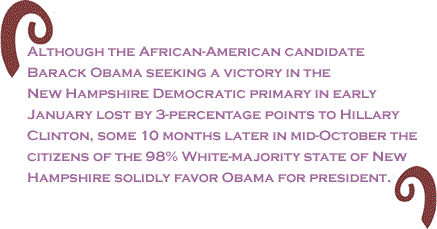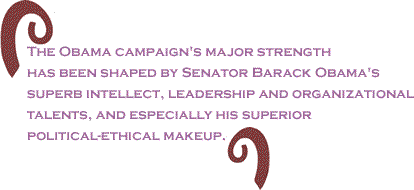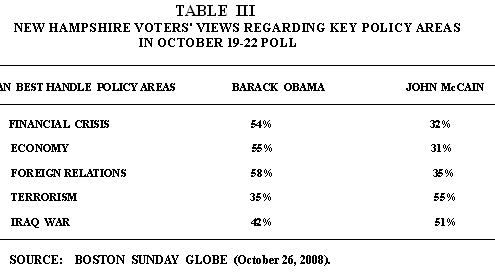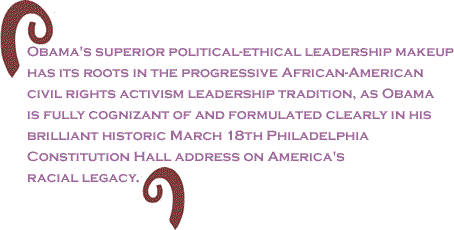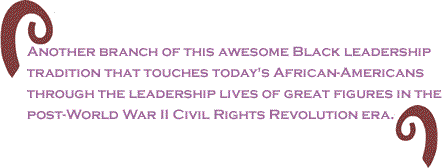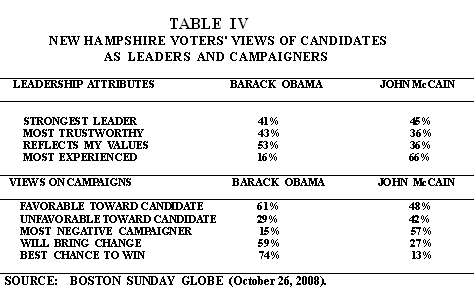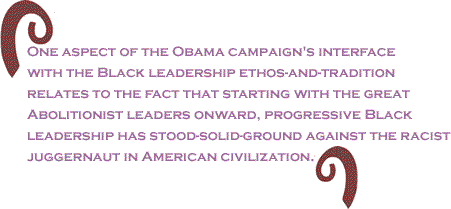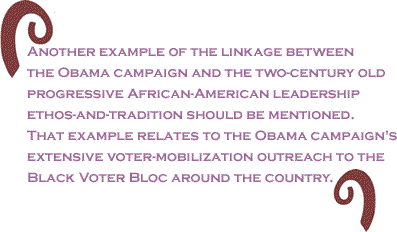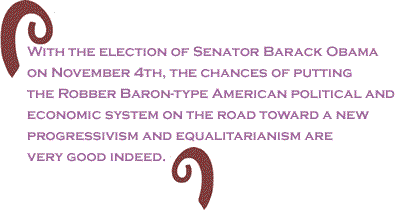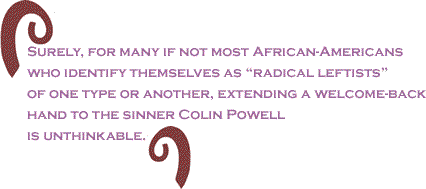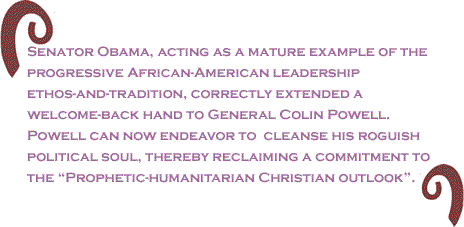
|
|||||||||||||||||||||||
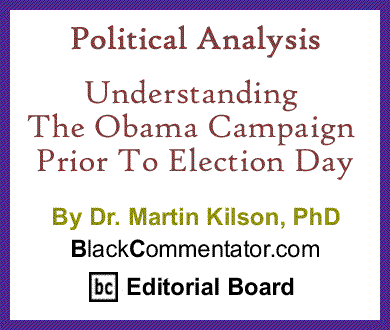
|
|

Custom Search
|
|
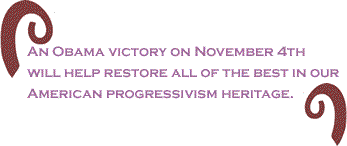 |
|
INTRODUCTORY OVERVIEW As the 2008 Obama campaign for president of the United States enters its final week before Election Day, November 4th, perhaps the best way to introduce my eleventh article on the Obama campaign is by referring to the status of the Obama campaign in state level polls around the country. I concluded my tenth article in Black Commentator (October 16, 2008) with a reference to the lead article in Sunday's New York Times (October 5, 2008) which surveyed the Obama and McCain campaigns' status in the Electoral College Count as follows:
I'm writing this eleventh article on October 25-26 weekend , some 21 days after the foregoing New York Times appraisal of the two campaign's Electoral Count status. Current state-level poll data reveal that the Obama campaign has steadily advanced ahead of the McCain campaign in its Electoral Count status. An idea of the Obama campaign's advance over McCain in Electoral Count is provided in TABLE I.
When reflecting in my tenth article (Black Commentator, October 16, 2008) on the Obama campaign's steady advance in the Electoral College Count, I referred to a lead article in the Boston Globe (October 4, 2008) titled “Obama Gaining Crucial Ground”. Noting that there were only “31 days until the election”, the Boston Globe article reported as follows:
Some two weeks later in an article titled “Key States Start Swinging Against McCain” in the New York Post (October 21, 2008), there was further evidence that “John McCain's electoral path is narrowing.” As the New York Post article put it:
IMPLICATIONS OF OBAMA ELECTORAL COUNT ADVANTAGE Two days before the New York Post's characterization of a declining Electoral College count capability on the part of the McCain campaign, the weekend “Daily Poll Summaries” by the USA Election Polls.com (October 19, 2008) added further data on McCain's decline. According to USA Election Polls as of October 19th, “Obama...has pulled ahead in a handful of critical [battleground] states such as Missouri and Virginia (by about six percentage points), Florida (about four points) and North Carolina (about two points). Also, in two neighboring states that both campaigns have targeted—Wisconsin and Iowa—the race looks very much like it does in Minnesota, with Obama holding leads of more than 10 points in recent polls.”
Moreover, in his New York Times (October 26, 2008) column, the recently anointed Nobel Prize economist Professor Paul Krugman offered an overall portrait of the broader political gains for the Democratic Party that could result if the Obama campaign's advances in the Electoral College Count hold up on November 4th. Commencing with the caveat that “Maybe the polls and the conventional wisdom are all wrong...”, Krugman then offers this prognosis:
Now turning to the data on state-level polls as of October 20-26 shown in TABLE I, an analysis of the Electoral College Count status of the Obama campaign as we enter the last week before November 4th suggests that an Obama victory is in the offing. First, if we consider the “Large Electoral Vote States” (California-55, New York-31, Florida- 27, Pennsylvania-21, Illinois-21, Ohio-20, Michigan-17, New Jersey-15, North Carolina-15, Virginia-13, Massachusetts-12, and Washington-11) , state-level polls supporting Obama are sizable. That is, they are in the 7-plus percentage point range. For example, in 10-point range in California; 14-point range in Illinois; 9-points Massachusetts; 13-points Michigan; 17-points New Jersey; 22-points New York; 12-points Pennsylvania; 8-oints Virginia; and 11-points in the state of Washington. Second, if we consider “Mid-Size Electoral Vote States” (Colorado-9, Iowa-7, Maryland-10, Minnesota-10, Oregon-7, and Wisconsin-10), state-level polls are also sizable. That is, they are mainly in the 7-plus percentage point range. For example, in the 11-point range favoring Obama in Iowa; the 15-point range favoring Obama in Maryland; 15-points favoring Obama in Minnesota; 14-point range favoring Obama in Oregon; and 13-point range favoring Obama in Wisconsin. Only in Colorado among “Mid-Size Electoral Vote States” is the state poll favoring Obama below 7-percentage points, standing at 6-percentage points as of October 26th. Third, when we consider “Small Electoral Vote States” such as Connecticut (4- EV) and New Hampshire (4- EV), state-level polls favoring Obama over McCain are in the sizable range and this is true also for the states of Vermont and Rhode Island not listed in TABLE I. For example, in Connecticut there's a 25-percentage point advantage for Obama, and in New Hampshire there's a 15-percentage point Obama advantage. Interestingly enough, only in the usually conservative Western “red state” of Nevada (4-EV) was the state poll favoring Obama below 7-point range—at 4-percentage point range as of October 26th. Finally, in regard to nationwide polls of voters' candidate preference as the third week in October ended, data based on ten polls of “likely voters” are shown in TABLE II. Among the first seven nationwide polls as of October 24th, Obama has maintained an average lead of 51% for Obama and 43% for McCain. Among the last three nationwide polls, however, Obama's advantage is 4% in IBD Poll, 3% in GWU (George Washington University) Battleground Poll, and 1% in Associated Press-GFK Poll. Let's hope that the Obama advantage margin –or some variant of it—in the first seven nationwide polls shown in TABLE II prevails on Election Day, November 4th.
OBAMA-FRIENDLY WHITE VOTER BLOC GROWS UP (1) THE ISSUES As readers of my long Black Commentator.com series of eleven analytical articles tracking the development of the historic Obama campaign (an analytical undertaking somewhat trying for a retired academic nearing 78 years old), I early expressed an interest in the phenomenon that I dubbed a “Liberal White Voter Bloc”in my ninth article for Black Commentator (October 9, 2008).
In my third article titled “Obama Between Super Tuesday And The Ohio & Texas Primaries” (Black Commentator, February 21, 2008), I introduced my preliminary ideas regarding the role in the Obama campaign of a “Liberal White Voter Bloc”. In a discussion of what I called “new electoral dynamics” affecting the Democratic primaries, I focused on aspects of White voting behavior in the February 10th Maine Caucus election. I described the Maine Caucus as an example of the “new electoral dynamics” in the Democratic primaries as follows:
Now what was the long-run political-operational meaning or significance of the majority of White votes for Senator Barack Obama in a 95% White state like Maine? Part of the long-run political-operational significance was suggested in an interview conducted by a reporter for the Boston Globe (February 11, 2008)--an interview that informed us of a “racially maturing” pattern among some White voters in America. The Maine citizen interviewed was 49-year old Carolyn Krahn who participated in the Maine Caucus in Freeport, who uttered two pregnant sentences to the Boston Globe: “It doesn't matter what color he [Obama] is. I think Maine is mature enough to vote for the better person.” Well, Ms. Krahn definitely got it right—that Senator Barack Obama was “the better person [candidate]”. As it happened, the Obama campaign was victorious in the Maine Caucus election, with Obama winning 59% to 40% for Hillary Clinton. Moreover, Obama's Maine Caucus victory came as a shock to the Clinton Machine which, as the New York Times (February 11, 2008) observed the following day, “Obama won 59 percent of the vote in a state that Mrs. Clinton had thought could be hers.” The New York Times article continued thus:
The Obama campaign's success with a “Liberal White Voter Bloc” in the Maine Caucus election was repeated in the so-called Potomac Primary states of Maryland and Virginia on February 12th. The full Potomac Primary included Washington, D.C., where, given that the District of Columbia's population is 70% Black, Obama secured the vast majority of Black support (75%) and won handily. However, in Maryland and Virginia where Whites are in the majority (Blacks are 29% of voters in Virginia and 37% in Maryland), the Obama campaign unexpectedly gained a 2-to1 victory in both primaries. He won 60% to 37% in Maryland, and perhaps even more surprisingly he won 64% to 35% in Virginia.
That the Obama campaign assisted the growth of a “Liberal White Voter Bloc” in the Old Confederacy state of Virginia during the Potomac Primary was undoubtedly an important achievement. So much so that the liberal essayist Bob Moser drew attention to it in the progressive journal The Nation (March 3, 2008). As Moser put it:
Finally, the surprising evidence of an expanding “Liberal White Voter Bloc” favoring Obama in the February 12th Potomac Primary in Virginia was commented upon by Frank Rich in his column in the New York Times (February 17, 2008). Noting that he “had my first newspaper jobs in Richmond in the early 1970s,” Frank Rich went on to observe that “I almost had to pinch myself when Mr. Obama took 52 percent of Virginia's white vote last week. ...Mr. Obama's ascension hardly means that racism is kaput in America...but it's impossible to deny that another barrier has been surmounted.” OBAMA-FRIENDLY WHITE VOTER BLOC GROWS UP: (2) CASE OF NEW HAMPSHIRE In arriving at his observation regarding the evidence of an expanding “Liberal White Voter Bloc” favoring Obama in the February 12th Potomac Primary in Virginia, the New York Times columnist Frank Rich was drawing attention to an emergent though struggling trend among a small segment of White Americans toward what I call “a new cultural-cosmopolitan identity”. As I remarked above, this trend toward a “cultural-cosmopolitan identity” among White citizens will mean leaving the old vicious cocoon of American racist attitudes, thereby fashioning a genuine interracial and multicultural American identity for themselves. Fortunately and to the surprise of many liberals and progressives, as the Obama campaign launched its post-convention quest to win the White House , that campaign became increasingly effective at persuading a small but growing number of White Americans to participate in the “Liberal White Voter Bloc”, thereby facilitating the election of the first-ever African-American president. Thanks to a quite full-some poll of New Hampshire voters in mid-October that was published in the Boston Sunday Globe (October 26, 2008) under the title “Obama Leads N.H. In New Poll”, we can describe the core political and attitudinal ingredients among White voters in a 98% White-majority state that make up a “Liberal White Voter Bloc” favoring Senator Barack Obama's election next week.
What follows is a two-part discussion of the attributes of a new “Liberal White Voter Bloc” in the 98% White-majority state of New Hampshire, attributes that have evolved during the 2008 presidential campaign. In the first part I discuss changes in political attitudes among New Hampshire voters. In the second part I discuss changes in ideological attitudes as they relate to racial issues in American life. A. New Liberal Political Attitudes In New Hampshire The survey conducted by the Boston Globe during mid-October among New Hampshire voters produced very interesting material regarding how core political and ideological attitudes have evolved during the long 2008 campaign season. Data regarding political attitudes are shown in TABLE III and in TABLE IV. Although the African-American candidate Barack Obama seeking a victory in the New Hampshire Democratic primary in early January lost by 3-percentage points to Hillary Clinton, some 10 months later in mid-October the citizens of the 98% White-majority state of New Hampshire solidly favor Obama for president. As the article in the Boston Globe (October 26, 2008) that reported on the poll of New Hampshire voters put it:
The responses to the question in the Boston Globe poll “Which candidate do you think would do the best job dealing with key policies”?, show that Senator Obama is strongly favored over Senator McCain in the crucial policy areas of “financial crisis” and “economy”. As the Boston Globe analysis of the poll put it:
The analysis of the poll in the Boston Globe provided an example of an establishmentarian oriented New Hampshire citizen who decided to participate in a pro-Obama “Liberal White Voter Bloc”. That New Hampshire citizen was described as follows:
As shown in TABLE III, Obama is favored by a nearly 2 to 1 margin to better handle key policy areas of “financial crisis”, “economy”, and “foreign relations”. When asked in the poll what policy-issue area was most important, the “economy-jobs issues” were identified by nearly one-half [47%] of New Hampshire voters, while the policy-issue areas of “Iraq war” and “terrorism” were identified by only 9% and 8% of New Hampshire voters, respectively. It should also be mentioned that when asked about the issue of “middle-class tax cuts”, the Boston Globe poll “found widespread support for tax cuts for the middle class.” This finding is clearly important to the Obama campaign because Senator Obama has campaigned aggressively for a policy of middle-class tax cuts, proposing such cuts for incomes under $250,000.
An additional range of political issues responded to by New Hampshire voters in the Boston Globe poll also inform us just how far along a large segment of White voters in New Hampshire have traveled toward joining what I call a pro-Obama “Liberal White Voter Bloc”. These political issues, as shown in TABLE IV, relate to both the “leadership attributes” of Obama and McCain and to their “campaign attributes”. In regard to “leadership attributes”, although it is no surprise that Senator McCain is considered by New Hampshire voters as “most experienced”, on the issue of “strongest leader” Senator Obama ranks only 4-percentage points behind Senator McCain—45% McCain, 41% Obama. However, in regard to the leadership attributes of “trustworthiness” , Obama was given 7-percentage point edge—43% Obama, 36% McCain. Furthermore, in regard to the cultural issue of “reflects my values”, Obama was given a 17-percentage point advantage—53% Obama, 36% McCain.
First, as shown in TABLE IV it is Senator John McCain who is viewed by a 3 to 1 margin as conducting “most negative campaign”--57% McCain, 15% Obama. Second, this view of the McCain campaign as a rather roguish affair surely contributes to New Hampshire voters' views that Senator Obama “will bring change” as president of the United States. Third ( and fascinatingly I think), the growth of a sizable “Liberal White Voter Bloc” among New Hampshire voters during the 2008 presidential campaign has resulted in the fact that an overwhelming majority of New Hampshire citizens believe that Senator Barack Obama has “best chance to win” on November 4th. B. New Attitudes On Racial Issues In New Hampshire A final aspect of attitudes among New Hampshire voters uncovered by the Boston Globe poll relates to new racial attitudes. It is no secret of course that conservative political attitudes among New Hampshire's majority White voters have not been conducive to typical liberal political patterns in that state, especially as the Democratic Party has been the conveyor-belt for liberal patterns.
What is now interesting in this regard during the 2008 presidential campaign is that the Democratic Party presidential candidate is an African-American, so that under the usually conservative political dynamics in 20th century New Hampshire one would expect that conservative and rightwing attitudes on racial issues would spell defeat for a Democratic Party African-American presidential candidate. Happily however, as shown by the Boston Globe poll data this aspect of New Hampshire conservatism is undergoing a metamorphosis. First, as shown in TABLE IV when asked in the Boston Globe poll do you “Have friends/kin/co-workers who oppose Obama because of race”, some 72% of New Hampshire voters say “no”, while only 22% say “yes”. This is an unexpected finding in the Boston Globe poll but it is also a finding that indicates there is expanding space among New Hampshire voters for an expansion of a “Liberal White Voter Bloc”. Second, when asked in the Boston Globe poll whether “Obama's race will have little or no impact on voting”, some 77% of the polled New Hampshire voters agreed. Only 7% of the polled New Hampshire voters said “yes” to the question -- “Many will not vote for Obama because of race.” Accordingly, it can be said that the overall conclusion to be drawn from the mid-October Boston Globe poll of New Hampshire voters is that there is expanding space among those voters for additional growth of a “Liberal White Voter Bloc”. Furthermore, we can also conclude that additional growth of a “Liberal White Voter Bloc” in New Hampshire will contribute to a victory for Senator Obama on November 4th.
NOTE ON OBAMA CAMPAIGN'S LINKAGE TO BLACK TRADITION As we now know abundantly, the Obama campaign brilliantly evolved to realize two significant and unprecedented achievements following its successes in the two-prong Super Tuesday and Potomac Primaries. One achievement was to defeat the Clinton Machine's quest in Democratic primaries for the Democratic nomination. The second achievement was to maneuver in the post-convention presidential campaign so that the Obama campaign is strong enough in state electoral polls to defeat McCain a week from now on November 4th.
Above all I believe, the Obama campaign's major strength has been shaped by Senator Barack Obama's superb intellect, leadership and organizational talents, and especially his superior political-ethical makeup, let's call it. In this regard, keep in mind particularly a crucial aspect of Obama's superior political-ethical makeup. Namely, that Obama's superior political-ethical leadership makeup has its roots—it should be emphasized here—in the progressive African-American civil rights activism leadership tradition, as Obama is fully cognizant of and formulated clearly in his brilliant historic March 18th Philadelphia Constitution Hall address on America's racial legacy. That African-American progressive leadership tradition extended back-in-time to great Abolitionist leaders like Frederick Douglass, Robert Purvis, James McCune Smith, William Cooper Nell, John Sella Martin, and J.W.C. Pennington. And this progressive Black leadership tradition propelled forward-in-time to late 19th century post-Emancipation era and 20th century progressive leaders. I have in mind great leaders like AME Bishops Henry McNeal Turner-Reverdy Ransom-R.R. Wright; Niagara Movement leaders like W.E.B. DuBois-Archibald Grimke-Monroe Trotter; NAACP leaders like W.E.B. DuBois-James Weldon Johnson-Walter White-Roy Wilkins; and trade union leaders like the founder of Brotherhood of Sleeping Car Porters Union — A. Philip Randolph. And another branch of this awesome Black leadership tradition that touches today's African-Americans through the leadership lives of great figures in the post-World War II Civil Rights Revolution era. Leadership figures like Fanny Lou Hammer, Ella Baker, John Lewis, James Lawson, Stokely Charmichael, Rosa Parks, Gloria Richardson, Julian Bond, Robert Moses, Roy Wilkins, Whitney Young, James Farmer, Rev. Martin Luther King, to mention just the tip-of-the-pyramid of the two-century deep progressive African-American leadership tradition. Accordingly, it is crucial to recall and understand this two-century old African-American progressive leadership tradition that has made today's 21st century Senator Barack Obama-inspired liberal Democratic Party electoral developments possible. Out of that African-American leadership tradition has now come an African-American presidential candidate of the Democratic Party, a Senator Barack Obama-led Democratic Party which is strongly prepared to win the presidential election on November 4th. In concluding this article, brief mention should be made of several aspects of the interface of the Obama campaign and the progressive African-American leadership ethos-and-tradition.
One aspect of the Obama campaign's interface with the Black leadership ethos-and-tradition relates to the fact that starting with the great Abolitionist leaders onward, progressive Black leadership has stood-solid-ground against the racist juggernaut in American civilization. The McCain campaign's roguish practices have been widespread from early September to now, as revealed in an Associated Press news report that a senior McCain adviser, Nancy Pfotenhauer, in mid-October that, as reported in Boston Globe (October 21, 2008) “the Republican presidential nominee still has a strong chance of winning the state because of his support in 'real Virginia', the downstate [mainly White] areas far removed in distance and political philosophy from the more liberal areas of the northern part.” Now in face of anti-Black maneuvers by White leadership , the progressive sector of African-American leadership has a tradition of standing-their-ground whenever possible. So such a progressive Black leadership response is clearly possible today, and Senator Obama has made this abundantly clear in the closing weeks of the campaign. Thus, at a political rally on October 25th in the conservative state of Nevada, Obama , taking his lead from the longstanding progressive Black leadership tradition, lambasted the roguish conservative and crypto-racist maneuvers by the McCain-Palin campaign and its minions. “We're going to have to work and struggle and fight for every single one of those 10 days [remaining in the campaign] to move our country in a new direction,” Obama remarked at a rally. “We cannot let up, and we won't”. At another late October rally on October 23rd in Ohio, Michele Obama was representing Senator Obama who had flown to Hawaii to be near his very ill grandmother. Responding to the roguish conservative maneuvers of the McCain-Palin campaign, Michele Obama offered a strong progressive response, one in keeping with the longstanding African-American progressive leadership tradition. “The old ways just aren't working; they won't do,” remarked Michele Obama. She continued in this vein: “We have to ask ourselves: 'Don't we deserve a Washington that reflects our values and our reality? Don't we deserve leaders who get it?'” (See New York Times, October 25/October 26, 2008). Another example of the linkage between the Obama campaign and the two-century old progressive African-American leadership ethos-and-tradition should be mentioned. That example relates to the Obama campaign's extensive voter-mobilization outreach to the Black Voter Bloc around the country. This Obama campaign undertaking is about an important progressive Black leadership tradition. Namely, it's about what I call the DuBoisian political orientation, that progressive Black leaders are “our-brothers-and-sisters-keepers”. It's about the progressive leadership ethos-and-tradition that obligates the middle-class and professional-class sectors to assist the social progress of the African-American weak and poor sectors.
Accordingly, from its early beginnings among a network of progressive African-American professionals in Chicago headed up by the public-policy lawyer and business leader Valerie Jarrett, the Obama campaign exhibited a keen understanding of both the need-and-leadership-obligation to advance extensive voter-mobilization among the Black Voter Bloc. The Obama campaign's political-information gathering network zeroed-in early on the depressing evidence regarding the quite high levels of voter apathy among too many citizens in the Black Voter Bloc. For example, as reported recently in the Boston Globe (October 23, 2008) there were—believe it or not—some 400,000 African-American registered voters in Florida in 2004 who did not vote! However, as the Boston Globe article observed:
For another example of the Obama campaign's understanding of progressive Black leadership “our-brothers-and-sisters-keepers tradition”, let me refer to another instance of that campaign's Black Voter Bloc mobilization. This example is the extensive Obama campaign voter-mobilization outreach to the Black Voter Bloc going on in North Carolina, a usually Republican-oriented state that the Obama campaign has put-in-play, based on the states 26% African-American population. To this end, as reported in an excellent article by Professor Horace Campbell in Black Commentator. Issue 295 (October 16, 2008):
What overarching message is derivable from this account of the linkage between the progressive African-American leadership ethos-and-tradition and the Obama campaign? For me that message is that with the election of Senator Barack Obama on November 4th, the chances of putting the Robber Baron-type American political and economic system on the road toward a new progressivism and equalitarianism are very good indeed.
Our society will be able to reconnect our 21st century “American failed state” (our predatory oligarchic, plutocratic corporatist democracy) with that genuine American progressivism ethos-and-orientation initially fashioned by that great American President Abraham Lincoln, fashioned out of the monstrous blood-and-gore of the Civil War that historian Drew Gilpin Faust deftly brings home to us in her book This Republic of Suffering (2008). And, of course, it was that other great American President Franklin Roosevelt who translated a genuine American progressivism into national-level federal economic policy mechanisms (in agriculture and financial markets), social policy mechanisms (social security and welfare), and cultural policy mechanisms (city parks, libraries, school construction) that put in place institutional infrastructures for advancing broad social mobility for Americans. An Obama victory on November 4th will help restore all of the best in our American progressivism heritage. CONCLUDING REFLECTIONS ON POWELL'S ENDORSEMENT OF OBAMA One final thought relating to the Obama campaign's interface with the “progressive Black leadership ethos-and-tradition”. This final thought concerns the political bombshell dropped by General Colin Powell during his interview with Tom Brokaw on “Meet The Press”, Sunday October 19, during which he announced his endorsement of Senator Obama's candidacy for president of the United States. This endorsement was a political bombshell because, owing to General Powell's nefarious roguish role in launching the illegal Iraq war in 2003, Powell had been a pariah personality among liberals generally and especially among African-Americans who have been the major voter bloc in this country that was massively opposed to the Iraq war. Thus, one crucial political and ethical issue surrounding Powell's endorsement of Obama was whether or not African-Americans in general and the mainline African-American leadership sector in particular would “welcome-back-a-wayward-African-American-son”, as it were. Powell prefaced his endorsement of Obama with a candid critique of the Republican White House and of the McCain campaign. As the New York Times (October 20, 2008) reported, Powell said:
Following these prefatory remarks, Powell offered a generous and thoughtful endorsement of the Obama candidacy for president. At the core of Powell's endorsement statement was a cogent appraisal of Senator Obama's leadership capabilities as revealed in the presidential debates.
Of course, the well-seasoned U.S. Army general named Colin Powell arrived at a view of Senator Obama as a “transformational leader” by viewing on television the same Obama campaign inspirational rallies around the country that we all have viewed. I think of the 100,000-plus Obama rally held in St. Louis in early October, the similarly 100,000-plus Obama rally held in Colorada in late October, and the several 70,000-plus Obama rallies held in other places like North Carolina and Pennsylvania. What other American candidate for the presidency of the United States during our post-World War II era lifetime has, through the simple force of his/her generic authoritative leadership attributes, stirred the souls-and-consciousness of typical American citizens on the scale of 100,000-plus to drop their daily chores for a moment to attend a candidates' rally? None to my knowledge.
And, mind you, Senator Barack Obama's “transformational leader” character revealed itself thousands of miles from his American homeland, during his brief overseas trip during the Democratic primary race when 200,000 Europeans in Germany attended an Obama address in Berlin. Yes some 200,000! This event, by the way, brought out the politically roguish and morally twisted core lying at the heart of our reactionary Republican Party leadership and its cynical minions in our country's media, as McCain and his handlers and as conservative radio talk-show hosts and television news pundits relished in the most vulgar ways in infantile put-down commentary on Senator Obama's “transformational-leader event” at that Berlin rally. Alas. As a result Senator Obama could not gain a poll-bounce upon returning to American shores after that Berlin rally—not one stingy percentage point poll-bounce. Our country is not well and a lot of healing remains to be done. Let's hope that an Obama victory on November 4th will start this sorely needed healing of our American soul! Be this as it may, how should a genuinely progressive African-American national-level leadership figure like Senator Barack Obama, hopefully on the verge of gaining election to the White House, respond to this evidence of political redemption—and perhaps moral redemption—by Gen. Colin Powell? Surely, for many if not most African-Americans who identify themselves as “radical leftists” of one type or another, extending a welcome-back hand to the sinner Colin Powell is unthinkable. On the other hand among African-Americans who—as I myself do— identify themselves as “pragmatic leftists”, extending a welcome-back hand to the sinner Colin Powell is, while not a decision made easily, nevertheless the correct decision. It is the correct decision especially in light of the progressive African-American leadership ethos-and-tradition. That leadership tradition is defined by what the Princeton University philosophy scholar Cornel West calls the “Prophetic-humanitarian Christian outlook”— an outlook that defined the great Abolitionist Frederick Douglass in the slavery era of the 19th century and that defined the great Rev. Martin Luther King in the Civil Rights Revolution Movement era. As such the best of the African-American leadership ethos-and-tradition opposes what Professor West dubs the power-centric and power-manic “Constantinian Christian outlook”. This is a corrupt rogue-like variant of the Christian outlook , a variant which would measure Colin Powell merely by his power-serving and greed-serving utility, which of course is precisely what defined General Powell's years in the service of the rightwing power-manic Republican Bush White House. After the Bush-Cheney-Rumsfeld cabal exploited General Powell for their evil and imperialist Iraq war-making purposes, they threw the general to the wolves, as it were. Thus, Senator Obama, acting as a mature example of the progressive African-American leadership ethos-and-tradition, correctly extended a welcome-back hand to General Colin Powell. Powell can now endeavor to cleanse-his-roguish-political-soul, thereby reclaiming a commitment to the “Prophetic-humanitarian Christian outlook”. I close by referring to Senator Barack Obama's welcome-back statement to General Colin Powell that was made on Sunday October 19th in North Carolina:
All the variants of serious liberal, progressive, leftists, and radicals among Americans in general and African-Americans in particular have, I suggest, an obligation to facilitate the election of Senator Barack Obama on November 4th. I hope all of us will make this contribution. This victorious outcome will, in turn, set the stage for a fortuitous convergence of momentous celebratory and commemoration events in 2009. Among these great commemoration events will be: One, the Inauguration of the first African-American president of the United States. Two, the commemoration of the 100th Anniversary of the NAACP, the great 20th century warhorse of Black people's civil and political rights without which today's Obama campaign would be unthinkable. Three, the commemoration of the 200th Anniversary of Abraham Lincoln's Birth. BlackCommentator.com Editorial Board member Martin Kilson, PhD hails from an African Methodist
background and clergy: From a great-great grandfather who founded
an African Methodist Episcopal church in Maryland in the 1840s;
from a great-grandfather AME clergyman; from a Civil War veteran
great-grandfather who founded an African Union Methodist Protestant
church in Pennsylvania in 1885; and from an African Methodist clergyman
father who pastored in an Eastern Pennsylvania mill town - Ambler,
PA. He attended |
|
Any BlackCommentator.com article may be re-printed so long as it is re-printed in its entirety and full credit given to the author and www.BlackCommentator.com. If the re-print is on the Internet we additionally request a link back to the original piece on our Website. Your comments are always welcome. eMail re-print notice
If you send us an eMail message we may publish all or part of it, unless you tell us it is not for publication. You may also request that we withhold your name. Thank you very much for your readership. |
|
| |
|
| October 30, 2008 Issue 297 |
|
| Executive Editor: Bill Fletcher, Jr. |
| Managing Editor: Nancy Littlefield |
| Publisher: Peter Gamble |
| Est. April 5, 2002 |
Printer Friendly Version
in resizeable plain
text format or pdf
format. |
| Frequently Asked Questions |
 |

|
 |
 |
 |
| |
| |





























